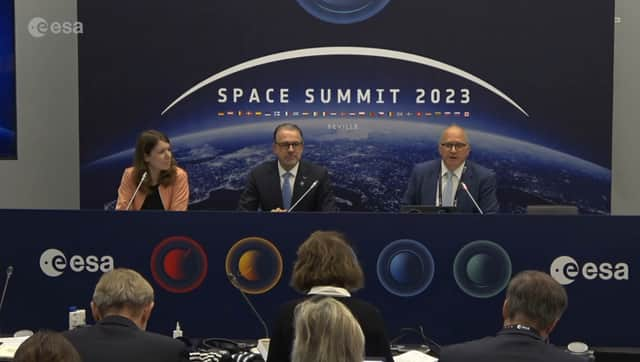ESA: European Space Agency launches project to develop a commercial space capsule


The European Space Agency (ESA) has launched a competition to build a robotic capsule to carry cargo to and from the International Space Station. It is expected the capsule will make its maiden voyage in 2028.
The competition winner will receive funding and technical support from the ESA but must operate on a commercial basis, by part-funding the development and "selling" the re-supplied "service" to ESA, who will become the "anchor customer". If the project is successful, the winner may be asked to upgrade the capsule to carry astronauts into orbit.
Advertisement
Hide AdAdvertisement
Hide AdESA director-general Josef Aschbacher said: "We will conceive [the capsule] in a way that it's not a dead end, meaning that it's open and can evolve in the future to a crew vehicle if member states decide to do so. Eventually, it could also evolve [to go to] other destinations, possibly to the Moon.
“We will buy a cargo return vehicle which should fly to the International Space Station by 2028. It will bring some tons of payload up to the space station, dock at the space station, and come back to Earth with some tons of cargo in the vehicle.”
He added that a tiger team was being set up inside the agency and has an initial budget of €75m (£65m) to get the competition under way after the project was backed by ESA member states at a summit in Seville, Spain, on Monday (6 November). However, the ESA will not specify the vehicle’s design, only the services it requires, including docking and re-entry capability, something yet to be provided by European vehicles.
Anna Christmann, a Green politician leading aerospace policy in the German government and chair of the Seville summit, said the ESA was going through a shift: "Public money is needed to start these kinds of competitions, but then that attracts investors to put money in through private companies. When we compare space budgets, Europe is not so different from others on the public side. The bigger difference is on the private side of investment, and that's what we want to change."
Advertisement
Hide AdAdvertisement
Hide AdThe change in the way the ESA runs its projects mimics the American method - where commercial companies such as SpaceX will work with Nasa who will offer fixed-price contracts and encourage progress with milestone payments. The supplier, in this instance SpaceX, provides Nasa with space transportation services that allow Nasa to send science missions far beyond Earth at a quicker and more efficient rate which has given Nasa access to faster, more innovative and lower-cost space technologies.
Comment Guidelines
National World encourages reader discussion on our stories. User feedback, insights and back-and-forth exchanges add a rich layer of context to reporting. Please review our Community Guidelines before commenting.
